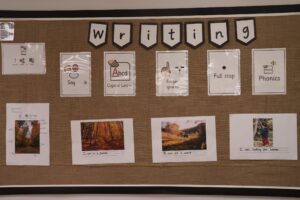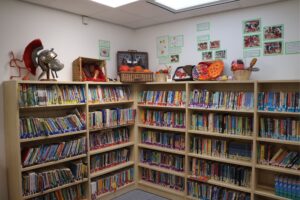English
English
The overarching aim for English in the national curriculum is to promote high standards of language and literacy by equipping pupils with a strong command of the spoken and written word, and to develop their love of literature through widespread reading for pleasure.
In addition to this, our English curriculum aims to encourage all children to write and read with enthusiasm. Children have access to diverse, high quality texts to support understanding and learning. Reading and writing are embedded within the broader curriculum.
Speaking and listening
Intent
We believe that our fundamental task is to teach our children to speak clearly and articulately. We pay close attention to the development of speech and language skills and from the Early Years, we intervene with speech and language support, identifying and removing as many barriers to learning as possible. Our intent is for our pupils to speak with confidence and listen actively in a wide range of contexts.
Implementation
Communication and language is one of the prime areas for the Early Years curriculum and ‘Literacy’ is one of the specified areas which help strengthen and develop the three prime areas, and ignite children’s curiosity and enthusiasm. The Early Years Statutory Framework states that the ‘development of children’s spoken language underpins all seven areas of learning and development. Children’s back-and-forth interactions from an early age form the foundations for language and cognitive development. The number and quality of the conversations they have with adults and peers throughout the day in a language-rich environment is crucial. By commenting on what children are interested in or doing, and echoing back what they say with new vocabulary added, practitioners will build children’s language effectively. Reading frequently to children, and engaging them actively in stories, non-fiction, rhymes and poems, and then providing them with extensive opportunities to use and embed new words in a range of contexts, will give children the opportunity to thrive. Through conversation, storytelling and role play, where children share their ideas with support and modelling from their teacher, and sensitive questioning that invites them to elaborate, children become comfortable using a rich range of vocabulary and language structures.’
Our English curriculum begins with emphasis on spoken language, acknowledging that children’s back-and-forth interactions form the foundations of language and cognitive development. The delivery of our Early Years curriculum centres around the development of language in a rich, stimulating learning environment. Our pupils, many of whom start school without age-appropriate oracy, have many opportunities for interactive speaking and listening. Through conversation, imaginative play, story-telling, role-play and engagement with books, songs and rhymes, new vocabulary can be introduced and embedded within a range of contexts. Crucial verbal interaction, with appropriate modelling from adults, is increasing pupils’ language and listening skills. At The Icknield, we have identified core vocabulary relating to each area of learning and development of the EYFS: in the Reception class, topics may change each year – in response to children’s interests – but these core words will be taught every year in readiness for Year 1 and beyond.
Oracy is one of our curriculum drivers; we encourage children to speak in full sentences, to use more ambitious vocabulary and distinguish Standard English from other spoken forms and use vehicles such as stem sentences, word lists and dramatic conventions across the school.
Impact
We aim to develop pupils’ speech, language and active listening as secure foundations for oral communication, reading and writing throughout the curriculum.
Phonics, reading and writing have been split up into different aspects, please choose the relevant section from the menu on the left.


